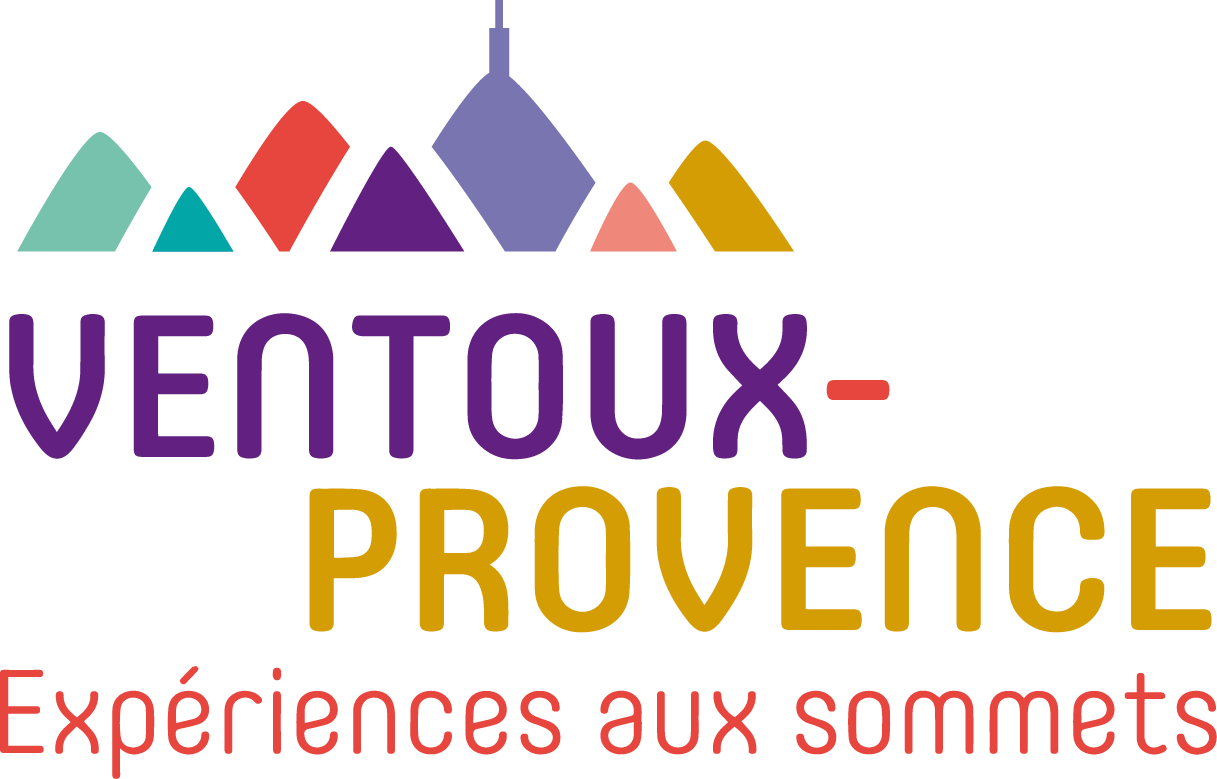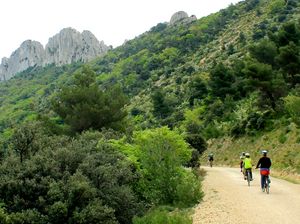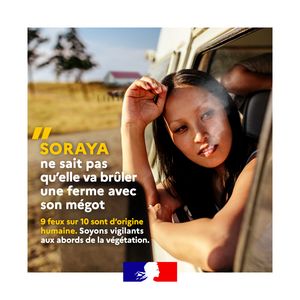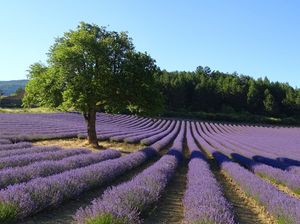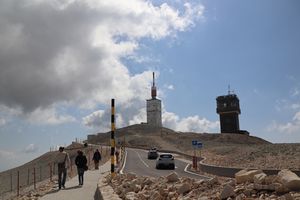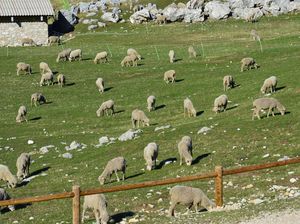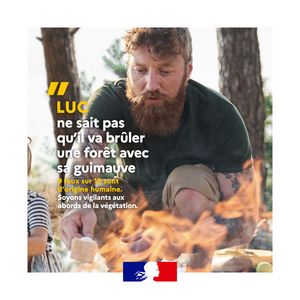Precious Nature. We all want to make the most of it but to do this we need to adopt the right habits, year round but particularly in the summer.
- Whilst walking, mountain biking, climbing etc I check daily the possible restrictions in place regarding acces to the forests. Possibilities of half and whole day closures.
- Prefer shorter walks and outings ! - I take lots of water with me and cover my head (sun cream is also useful !)
- I keep an eye on the children and elderly with me and make sure they drink enough.
During a heatwave the concentration of ozone in the air increases and can irritate the respiratory system. It is important to limit outings and physical efforts, particularly for the more vulnerable.
The last few years have been marked by high temperatures and droughts that have noticably increased the fire risks. In 2021 almost 250 hectares went up in flames in the Dentelles de Montmirail, traces of which can still be seen between Beaumes-de-Venise, Saint-Hippolyte-le-Graveyron and the Barroux...
9 fires out of 10 are of human origin !
To protect our woodlands and to protect ourselves incase of fire, always remember these ‘basic rules’ !
- I make sure that I pick up all my rubbish, even the biodegradable bits ( glass and plasic can be dangerously reflective).
- If I’m a smoker : I don’t smoke in the forest ; in the countryside as in urban areas I collect my cigarette butts and I’m careful with the ashes (reminder : the fine for throwing a cigarette butt out of the car window is 135€ !).
- I don’t light any fires or do wild camping (camping is forbidden in the forests from the 1st of July to the 15th of September).
From the end of June to the beginning of August, a beautiful sight is to be seen all around Sault. Please be sensible and respect the wonderful work of the lavender farmers…
- Don’t pick the lavender flowers, they’re the fruit of a years labour and the income of the lavender producers who maintain and farm these fields year after year.
- Don’t go into the fields, rather take photos and videos from the side of the fields, we reveal some of the best spots in our guide Lavender, the blue gold from the Pays de Sault, pdf, 1.78mo
Badly parked cars can damage areas and make access difficult to certain sites, particularly for the emergency services in the case of accidents or bad weather. Be careful to always use the parking areas reserved for motor vehicles.
Zoom on… the Mont Ventoux
On the summit of the Mont Ventoux, never park outside of the specified areas (free parking) : one of natures wonders could be hidden under each stone : a birds nest, a protected species of flower… Since the summer of 2022 you can consult « affluences » which allows you to see live information on the availability of parking spaces.
See : Map of the parking areas, pdf, 10.06mo on the summit and Affluences, live availability of parking spaces (May to October)
I remember the differences in temperature : up there, even in the height of summer, it can be cool ! Whether I go up by car, bike or foot I take a jacket. Live temperatures from the summit of the Mont Ventoux.
Zoom on…the Toulerenc Gorge
Since 2021, at the hamlet of Veaux (Malaucène), two car parks, one on each side of the river, offer 60 obligatory parking spaces at 10€ a day. Cars parked outside of these areas hinder emergency services or block acces to fields….Cars may be towed away and are liable for fines.
These decisions were made to reduce the amount of walkers at any one time in this preserved natural environment that is highly impacted by the excessive amount of tourists in the summer. In the stony Toulerenc river :
- I check the weather, access to the river is forbidden when there are storm risks (rapid rise in water levels).
– consult the storm risks andflood warnings.
- I check possible water pollution levels - I wear suitable footwear (trainers with laces or walking boots, no sandals or flip flops…).
- I give preference to the GR footpath that overlooks the gorge.
- I avoid walking in the water.
- I don’t build barrages with the children (encourages stagnant, warmer water which has a negative impact on the aquatic environment). On the contrary, if I see barrages I can suggest a game with my children of dismantling them !
- I avoid doing this walk with elderly people and young children (not recommended for children under 7 and it’s best to know how to swim).
If you come across a flock of sheep avoid approaching it, there may be a dog protecting them. Walk around them leaving as much distance as possible.
If you find yourself face to face with a sheepdog, particularly the larger Pyrenean Mountain dogs that are used to protect from wolf attacks (large white longhaired dogs) follow this advice. Despite the fact that these dogs are there for dissuasion and not to attack, they are nonetheless quite daunting and often bark to frighten you :
- Don’t try to stroke or to take a photo of the dog or the flock - Avoid looking the dog in the eyes (it can be seen as provocation)
- Avoid sudden mouvements, don’t raise your arms (let him feel that he’s the dominator) , don’t throw stones
- If you have a walking stick keep it by your side or place it on the ground
- If you’re on a bike, get off and push it calmly
- If you have a dog keep it under control and beside you, it should naturally adopt submissive behaviour. If it doesn’t, do not intervene in the case of an eventual confrontation
- If you are carrying a bag, slowly place it infront of you
- If you have children with you, slowly position them behind you to protect them
Stay calm and passive letting the dog follow you for a while, talking gently to it if you like. Limit your mouvements until further away from the flock. Don’t try shouting to call the shepherd. The dog will return to its sheep once it considers them to be safe.
Our terroir is rich in sun-ripened fruit ; strawberries, cherries, apricots, tomatos, grapes, peaches and nectarines…The precious produce of our local farmers.
I don’t pick fruit myself but visit the numerous farm shops and farmers markets to find fresh, freshly picked products.
Summer is a convivial time of year. However I remain aware of the dangers, particularly if staying in the countryside or woodland.
Be careful of barbecues*, ashes and cigarettes.
Don’t do DIY near vegetation especially with tools that can create sparks. Locals, remember to cut back and maintain gardens and outdoor areas year round. However, don’t burn cuttings, strict rules exist and often it’s forbidden, even in the winter (fire risks and air pollution). Local recycling centers are usually equipped with machines to deal with green waste.
Lastly, in the case of severe drought conditions, I limit my water consumption such as : watering plants (best late evening or early morning), the topping up of swimming pools, car washing outside of official car washes….
*Some villages forbid barbecues in the summer months, check with the local Town Hall.
